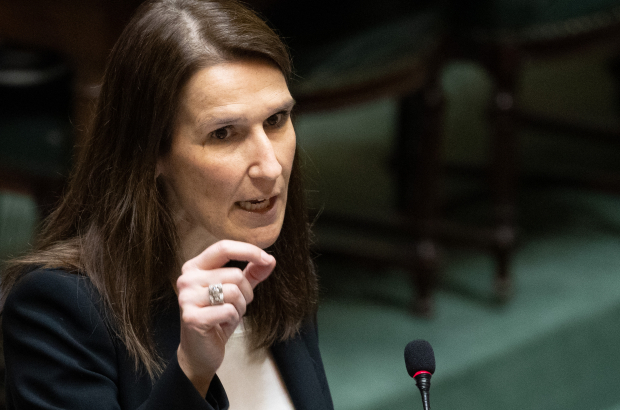- Daily & Weekly newsletters
- Buy & download The Bulletin
- Comment on our articles
Belgium's human rights record presented to UN review body
Deputy prime minister and foreign minister Sophie Wilmès attended the Universal Periodic Review (UPR) of the Human Rights Council (UNHRC) on Wednesday, representing Belgium at the UN’s assessment of the human rights situation in its member states.
Every year, three UPR sessions are held, each covering 14 countries. In this way, the 193 member states of the United Nations are assessed every five years. Belgium was also assessed in 2011 and 2016.
During the third UPR cycle, member states are again expected to spell out steps they have taken to implement recommendations posed during their previous reviews and highlight recent human rights developments in the country.
This year, the main topics addressed by Sophie Wilmès regarding the state of human rights in Belgium include: racism, gender equality, LGBTI and transgender rights, access to employment for people with disabilities, child poverty, asylum and migration in particular the situation of minors.
Wilmès said that Belgium attached great importance to this, the country’s third periodic review: "Human rights are part of Belgium's identity," she said.
The UPR allows for a horizontal dialogue between all UN member states, based on the recognition that no state has a perfect human rights record and that it can always be improved. At the same time, the UPR offers a rare opportunity to raise awareness among states about national legislation or practices that could have a negative impact on human rights within their borders.
The principle of the universal periodic review, therefore, is the possibility that other countries may make comments and recommendations.
In addition to the main topics, Wilmès also addressed issues that have come to the fore since the last review, such as the state of Belgium’s prisons, police brutality, and sexual violence – issues raised at this year’s review by other UN members concerned over Belgium’s record.
Regarding prisons, she told the review that overcrowding in Belgian prisons had decreased. "Since 2013, Belgium has seen a marked decrease in prison overcrowding," Wilmès said, responding toto a challenge from the UNHRC. "We were at an average overcrowding rate of 11% over the period 2015-2020."
"Three new prisons have been opened,” she added. “The construction of more prisons and new forensic psychiatry centres is underway or planned."
Wilmès then spoke about the behaviour of Belgium’s police forces, a topic that has become increasingly prominent in the media over the past two years due to incidents of racism, sexual harassment and violence, deaths attributed to police actions and reports of excessive force. She told the review that Belgium is focusing on the ongoing training and education of officers in a bid to address problems within the police.
Responding to recently voiced concerns by the United Nations Committee for the Elimination of Racial Discrimination (CERD) over alleged racist violence and profiling by the Belgian police, Wilmès said that ethnic profiling by the police, a problem many other countries need to address, is prohibited in Belgium.
Regarding sexual violence Wilmès told the review that Belgium plans to double the amount for the care of victims of sexual violence by 2023 and pointed out that the federal government intends to increase the number of existing Sexual Violence Centres (VCSs) from three to 10. "Most member states have put positive emphasis on the progress made in recent years, and the recommendations are constructive," she told reporters after the session had concluded.
Belgian bureaucracy also came under the spotlight, specifically when it came to questions about the country’s record on asylum and migration. Referring to the institutional complexity of her government, Wilmès said that it was "more a problem of form than substance" but accepted that it had hindered Belgium’s progress on the Optional Protocol to the Convention against Torture and other Cruel, Inhuman or Degrading Treatment or Punishment (OPCAT), a topic raised numerous times during the review. Belgium signed the human rights treaty in 2005, but has never ratified it, unlike almost all other European states.
Belgium announced in 2019 that its aim was to set up regular visits by independent experts to places where people deprived of their liberty are located, in order to prevent any degrading treatment. While this initiative was agreed upon within the different parliaments in Belgium, OPCAT requires the creation of a National Prevention Mechanism (NPM), and that is where progress has faltered. The unwieldy nature and complexity of Belgium’s political structure regularly frustrates decision-making on a national scale. "I find it difficult to understand why we don't move forward more voluntarily," admitted Wilmès.
Belgium was also challenged by Spain about its non-ratification of the Framework Convention for the Protection of National Minorities, which it signed in 2001. Among the sticking points is the question of language rights, an explosive subject par excellence in Belgium. Wilmès admitted that she could not predict how things would progress but that a group of experts has been set up to continue the work on the main issue that prevents Brussels from moving forward: what is a "national minority"?
Russia echoed Spain’s concerns on the topic and called for Belgium to “increase efforts to achieve the linguistic rights of minorities, including the rights of French-speaking minorities in Flanders.”
Belgium will have to give a preliminary answer on the recommendations it accepts by Friday. It will then have until September to finalise its final response.















Comments
Russia, giving lessons to Belgium about human rights? What a joke!